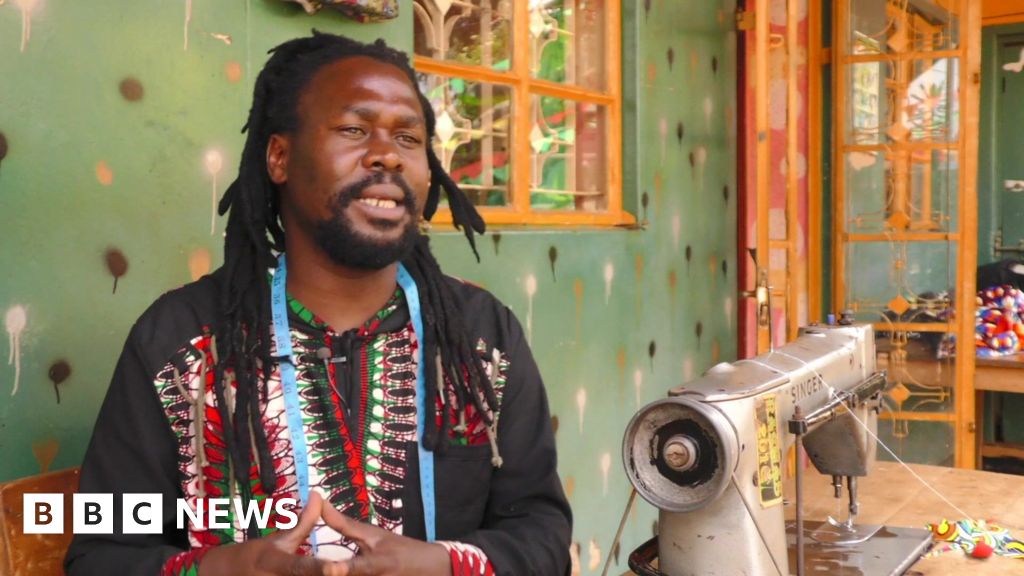Latif Madoi, a prominent Ugandan designer, was at his fashion academy on 13 May when police officers marched into the building.
To Mr Madoi’s suprise they put him in cuffs, arresting him and four of his students. They also seized some of designer’s sewing machines and finished garments.
Mr Madoi’s offence? Prosecuters charged the 47-year-old with possessing “uniforms declared to be for the exclusive use” of the military and police, which is illegal under Ugandan law.
More than a month later, Mr Madoi remains in Kasangati prison, on the outskirts of the capital, Kampala.
He is “depressed”, his lawyer George Musisi told BBC News, and having to cut off the dreadlocks he spent 17 years growing is one of the main reasons.
Haircuts are standard procedure for all inmates in Uganda but Mr Madoi’s locs were key to his Rasta identity, Mr Musisi says.
This sentiment was echoed by Bobi Wine, Uganda’s charismatic opposition leader and singer, whose real name is Robert Kyagulanyi Ssentamu.
After visiting Mr Madoi in jail, Bobi Wine told his two million followers on social media platform X that the designer’s “greatest pain was having to lose his dreadlocked hair”.
Critics are convinced Mr Madoi was locked up because he designed Bobi Wine’s signature, fire engine-red overalls.
The hashtag “#FreeLatif” has been circulating among Ugandans on social media, with the self-styled “ghetto president” weighing in.
“I publicly wear the overall that he made for me, why should he be in jail for making it?” Bobi Wine asked his X followers.
The police say that when they raided Madoi’s school, they found illegal garments including “military overalls”, “military caps” and an “army green pair of shorts”.
Since 2005, wearing military uniform has been illegal in Uganda. The government recently added red berets, which Bobi Wine and his supporters have become known for wearing, to the list of outlawed garments.
Mr Madoi’s lawyer says he doesn’t believe the police seized illegal items from his school.
He also argues that the force should have provided him with pictures of the garments in question, but police spokesperson Patrick Onyango told the BBC that “exhibits” are only handed to their owner “after the case has been disposed of by the courts”.
Mr Madoi was well known in Uganda even before his affiliation with Bobi Wine.
The designer has bagged a couple of African fashion awards and Ugandan newspaper the Daily Monitor called him a “revolutionary garment designer of the first degree”.
As well as Bobi Wine, Mr Madoi has made clothes for public figures like Lucky Dube, a late South African reggae star, and Jamaican hitmaker Busy Signal.
Mr Madoi also founded and teaches at a fashion academy – the one raided by the police last month. His ambition, he once said, is to give his students “skills to get by in life, earn enough money to do more than survive”.
His arrest coincided with a crackdown – or what police called an “intelligence-led operation” – on civilians wearing actual or lookalike military and police uniforms.
On the day Mr Madoi was detained, Uganda Police Force said they were “cordoning off areas, conducting searches in targeted premises, collecting all items reserved for security forces, prosecuting suspects found with such items, and restoring order”.
A handful of people were arrested during the operation, including an MP from Bobi Wine’s National Unity Platform party and a cleaner at his home, the police said.
Mr Musisi feels Mr Madoi was arrested to “intimidate the opposition and its supporters”.
In Uganda, security forces have a long history of going after President Yoweri Museveni’s political opponents.
Bobi Wine, the president’s strongest challenger, has been arrested numerous times and faced several charges, including treason.
Police even shot at the former singer while he was campaigning in 2021 and the NUP party often complain their members and supporters are being targeted.
The authorities deny the arrests have been political and say they have been necessary to maintain law and order during opposition protests.
After visiting Mr Madoi in jail, Bobi Wine said the police “took away many of his machines and brought his business to a standstill”.
Fellow designers in Uganda now fear the same thing might happen to them, one garment maker told the BBC.
“That thing shocked us designers,” says Lwazi Paddy, who works under the name Miracle Designr.
Mr Paddy, who says he got his start by studying at Mr Madoi’s school, says: “[Madoi] just creates red attire for people. And as designers, we get clients who like such things… he’s just doing whatever he does in a rightful way.”
Mr Madoi will leave prison for a short time on 24 June to attend a court hearing – there he will find out whether his request for bail has been granted.
Mr Musisi is “optimistic” – he says he has witnessed defendants in similar cases get off without being convicted.
“The intention is to send fear and terror into the supporters of the opposition party, not necessarily prosecution,” he says.
But even if this does prove to be the case, the cutting of Mr Madoi’s dreadlocks means he will be reminded of his experience every time he looks in a mirror for a long time to come.

